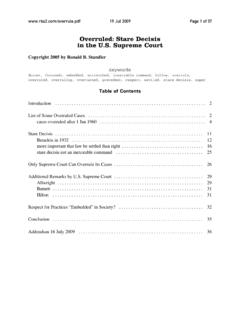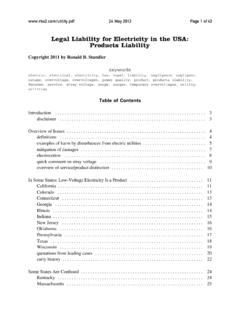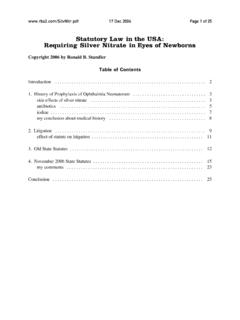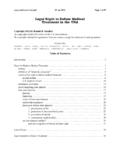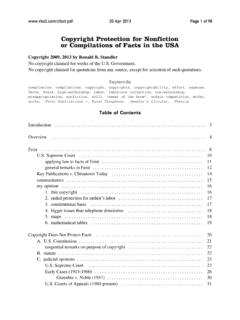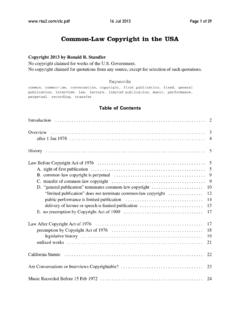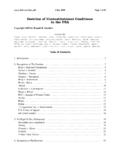Transcription of Legal Duty of Parent in USA to Pay for Child's …
1 Aug 2003 Page 1 of 25 Legal duty of Parent in USAto Pay for Child s College EducationCopyright 2003 by Ronald B. StandlerTable of Contents1. Introduction .. 2only divorced parents .. 2disclaimers .. 32. Traditional Law in the USA .. 3Is a college education a necessity? .. 43. Support of Undergraduate Education .. 6 Pennsylvania law 1963 to 1992 .. 6 Pennsylvania law after 1992 .. 9 New York law .. 10 New Jersey law .. 12 Massachusetts law .. 14a few cases in other states .. 15equal protection .. 17common law about estrangement .. 18divorce separation agreements .. 204.
2 Support of Graduate Education .. 21parents rarely required to pay for graduate education .. 245. Conclusion .. Aug 2003 Page 2 of 25 1. IntroductionIn October 1992, I did Legal research for a case in Pennsylvania involving the Legal obligationof parents to pay for their child s graduate education ( , medical school, law school, etc.). In July 2003, I did some additional Legal research and wrote this essay. My search in July 2003was concentrated in the states of northeastern USA, particularly Pennsylvania, New York,New Jersey, and Massachusetts. This topic of this essay is not what loving parents should do for their children.
3 The topic isthe circumstances under which courts will order a Parent to pay for part of their child spost-secondary education ( , vocational training, undergraduate college, or even graduate school). only divorced parentsWhen parents are married prior to the birth of their child, and those parents remaincontinuously married until after the child earns a bachelor s degree, then courts in the USAgenerally do not order the Parent (s) to pay for part of their child s college education. Such ajudicial inquiry would inappropriately intrude in the family , following divorce, courts in the USA sometimes do order a Parent to pay at leastpart of their child s educational expenses: tuition, fees, room and board in an on-campusdormitory, books, etc.
4 This essay mentions the conditions that courts have used to decide whethera divorced Parent should pay for the child s educational expenses. In a typical case, a divorced mother, son, or daughter sues the father (the noncustodial Parent )for either reimbursement of educational expenses, modification of a child support order, orenforcement of a written divorce separation agreement. Enforcement of a written divorceseparation agreement is usually straightforward contract law, but the other types of litigation arecomplicated, and involve both statutes, common law, and equitable principles, as explained in thisessay. Family law ( , the obligation of the parents to support their children, divorce law, etc.)
5 Isexclusively state law and the law varies significantly amongst states. Therefore clearly expressedlaw in one state may be not only incorrect law for another state, but also is probably irrelevant inanother state. As explained below, the law is evolving, so a correct explanation of the past law inyour state may not be valid now, and may not be valid in the are technical Legal issues about which court has jurisdiction to hear the case. If thenoncustodial Parent is living in the state where the divorce was granted, then the jurisdiction issimple: a court in that state will hear the case. However, if the noncustodial Parent is living in adifferent state from where the divorce was granted, then there are two Aug 2003 Page 3 of a court imposed a child support order, then the court in the state where the divorce wasgranted may have continuing jurisdiction in the case.
6 The litigation would then continue in thatdivorce court, which would issue a judgment. The winning plaintiff would then take thatjudgment to a court in the state where the defendant is living, and that second court wouldenforce the judgment under the full faith and credit clause of the there is a written contract that obligates the defendant to pay educational expenses, theplaintiff can file litigation in the state where the defendant is currently living (in order to getpersonal jurisdiction on the defendant), and the entire case proceeds in that one court. That court might apply local law to the case, or might apply the law of the state where thedivorce was granted (particularly if there is a choice of law provision in the writtenagreement).
7 DisclaimersBecause of the variation of law amongst the different states and because the law in each statechanges with time, to understand your current Legal rights, you need to hire an attorney who isknowledgeable about family law. This essay is intended only to present general information about an interesting topic in law andis not Legal advice for your specific, personal problem. See my disclaimer . I list the cases in chronological order in this essay, so the reader can easily follow the historicalevolution of law. If I were writing a Legal brief, then I would use the conventional citation ordergiven in the Bluebook and focus on cases in one state.
8 Further, I did a cut-and-paste of somecitations from Westlaw into this essay, and Westlaw does not follow the Bluebook citation format. Frankly, I am more concerned about having accurate citations than following petty rules, or havinga consistent citation format it is the content ( , information) that is important, not the citationformat. 2. Traditional Law in the USAThe law in the USA prior to the year 1965 was that children became adults at age 21 years. parents no longer had a Legal obligation to financially support their children, after their childrenbecame the pre-1950 America, graduating from college was neither ordinary nor routine. While people in the learned professions ( , attorneys, physicians, scientists, engineers,professors, pharmacists, school teachers, etc.)
9 Were all college graduates, most adults in the USAnever attended Aug 2003 Page 4 of 25 During the 1970s, there were two major changes that are relevant to the topic of this age at which children became an adult was lowered to 18 became common for people to attend two changes operate in different directions. The first change means that most students inundergraduate college are legally adults, for whom their parents may have no Legal duty to support. But the second change means that college is no longer reserved for the few intellectual elite:now most people of above-average intelligence commonly attend college and it is commonlybelieved by many people that a bachelor s degree is required for success.
10 The second change madeit easier for judges to order parents to pay for their child s undergraduate college education. The decrease in the age of majority occurred in the year 1973 in a college education a necessity?A number of courts in the USA have declared an undergraduate college education to be a necessityof life, for example: Rhoderick v. Rhoderick, 263 512, 519 (Md. 1970)( The modern trend of the appellatedecisions in the United States generally is to find that a college education is a necessity if thestation in life of the infant justifies a college education and the father is financially able to payor contribute to the payment for such education.)
